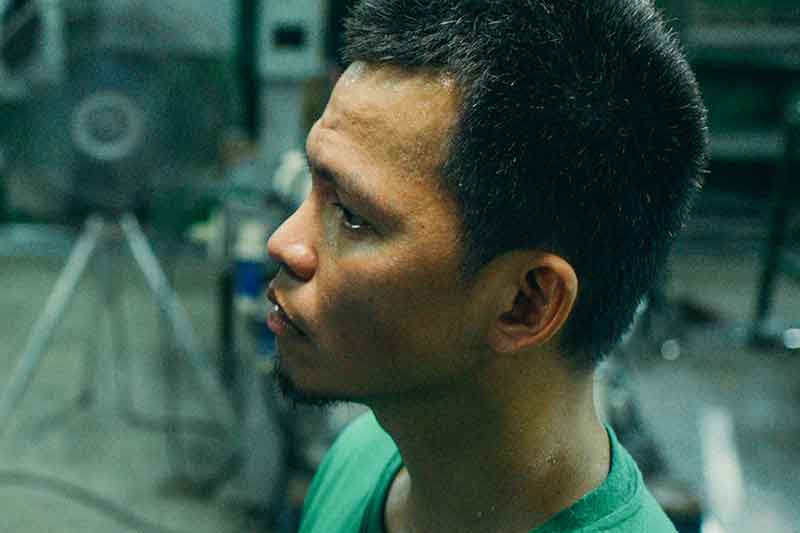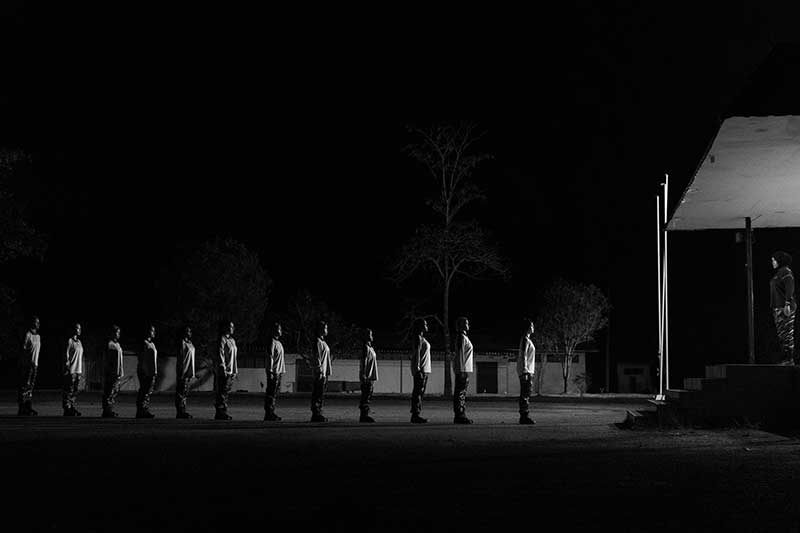This year, getting tickets at QCinema felt like an Olympic sport. With buzzy international films like Anora in the lineup, tickets tended to sell out fast. It was partly a function of the venues; the theatres assigned to QCinema’s film buffet were often smaller than needed. The demand wasn’t just limited to the feature films. At the core of this year’s festival were two short film programs: one brought together Southeast Asian shorts (some of which have traversed the festival circuit) and Filipino short films financed by the festival, and another, dubbed the “Expo,” was a curated selection of nonfiction and other shorts. The screenings for these programs were as limited as the others, and I went to two non-gala premiere screenings and the theatres were almost full.
I was curious about these films partly from advance buzz and what I knew of past festivals. Having sat through three pretty filling and thoughtful programs, my curiosity was more than satisfied. To unpack this satisfaction, here are four things at QCinema that were worth noting.
Anyone familiar with the local film scene knows that a good number of film festivals focus on films that are funded by a supporting organization. The quintessential example of this is Cinemalaya, whose grant system has produced a small fleet of feature films that often generate buzz at the festival screenings but whose afterlives are all over the place (a fate, sadly, shared by so many of these funded features across the local circuit). Cinemalaya is also notable for its shorts program that mostly features emerging filmmakers, but these do not receive the same financial treatment.
QCinema began in part as a festival funding features, but I found the decision to focus instead on funding shorts a brilliant one. For instance, a film with the kind of world-building like Rampage, a queer dystopian fantasy that made use of practical and CGI effects in significant ways, requires a substantial budget and the grant goes a long way to making it happen.
Having a grant really helps films bring out the best in all the talent, and I felt that the funded shorts at QCinema were all crafted with care. When a CGI-heavy film like Water Sports or the queer dystopian action film Rampage impresses audiences, it is probably money well spent.
QCShorts International 2024’s local lineup this year was notable for having three short films that were set in relatively realistic settings, including the family drama Kinausap ni Celso ng Diyos and the coming of age story Supermassive Heavenly Bodies. Arguably the most realistic of these three shorts was Refrain, a reflective glimpse at the struggles of a young musician. These films stood out at a festival usually notable for experimentation and speculative fictional themes.
The jury winner this year (and my best short in that program), was Celso, which deployed its magic realist twist in a way that tied the bow on a well-constructed story. Supermassive Heavenly Bodies, on the other hand, offered a new take on struggles with body image and the best child acting I’ve seen in the festival.
I was glad that the Southeast Asian lineup provided some balance on the realist front, and my favorite film in this was the black and white Washhh from Malaysia, which I will go back to in a bit. It was set in an all girls secondary military academy, and the treatment was necessary to help focus its theme. All in all, I felt that these films gave me hope about the kind of realist or semi-realist storytelling that I appreciate for opening new vistas about the world I encounter every day.
For this note, I wanted to talk about two of the films in more detail. I already introduced the film Washhh and this film, as a friend reported the filmmaker saying, only makes sense if one understands the complications of racial politics in Malaysia. Such a topic is so sensitive, to put it mildly, that the film cannot be shown publicly in its filmmakers’ home country. What made this film work was that it cleverly set its hot button topic of race relations in the web of relationships between young women in a military boarding school at a moment of crisis.
On the other hand, Invisible Labor, a documentary highlighting the almost invisible work involved in archival research, focused on the story of a custodian at the Ibon Foundation whom archiving advocate (and friend) Rose Roque met while she was researching on the progressive media collective Asia Visions. His work in helping preserve the Asia Visions collection proved helpful in making it available for researchers in the future, and Roque made it clear in her work that such invisible labor often went unacknowledged. That inspired this project, which (in the best didactic traditions of the Philippine Left) concluded with the trope that things have not changed much for (invisible) laborers since the time of those archived works. The satisfaction of seeing how archival processes involve people whose commitment includes the work that we hardly see is one of its strengths.
These two films made it clear to me that the political can be rendered personal in unexpected ways, both in fiction and nonfiction, and these can be compelling tales to tell.
My last note has to do with two of the films I mentioned earlier. Celso’s hero is played by Bullet Dumas, and in case this name rings a bell for longtime observers of Manila’s indie music scene, he is one of the more prominent singer-songwriters who (with Johnoy Danao and Ebe Dancel) used to have small venue shows which drew a relatively large and devoted crowd. I wasn’t surprised about Bullet’s acting turn; he was in a stage musical recently and an earlier role in Khavn de la Cruz’s Makamisa film was also shown at QCinema. However, Bullet’s work in Celso, his first as a lead, combines pathos and a surprising note of hope which he articulates in an understated though sincere way through his subtle acting matter.
What surprised me (even though I received advance word of it) was a true newcomer to film acting from the music world. April Hernandez, who records under the name “thesunmanager,” was cast as Lisa, the lead character of Refrain. The film is an emotional portrait of a musician who lives in the shadow of her parents’ struggles to give her a better life, and much of April’s work in it is marked by an intensity her character could not articulate in words.
If there's one aspect of their past performing work that translates into the screen, it is the way they can compellingly connect with people on stage with their music and the emotions in them. This connection, above all else, is an embodied one, and their acting, given the material, can reflect this. I think these films are a promising beginning for these performers, and I wish I could see these words collide more.
This QCinema was the first time I dipped into a local film festival since returning from abroad in mid-2020. It was an experience that inspired me about the future of Philippine cinema and how I could strengthen my understanding of Southeast Asian cinematic efforts. This won’t be the last time these things will be exciting and inspirational, and to live (and make) such experiences might be in the cards.
Images courtesy of QCinema


